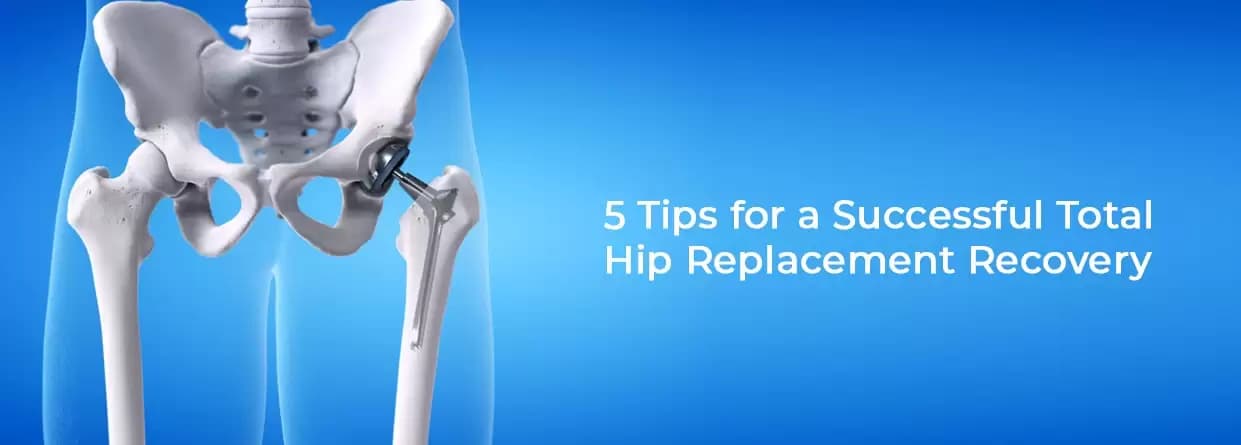
Surgery is one of the most important and intense steps in any treatment plan and during the recovery phase following an orthopedic surgery
Surgery is one of the most important and intense steps in any treatment plan and during the recovery phase following an orthopedic surgery the patient must follow and take care of the important steps and measures that are recorded recommend by their doctor to ensure long-term health and mobility.
After 24 hours of undergoing hip replacement surgery, the patient is advised to walk with the help of a walker or assistive devices under the supervision of medical experts. It is mostly recommended by the doctor to the patient to move safely after the surgery while protecting the new hip as it heals.
In a Total Hip Replacement Surgery, the damaged sections of the hip joint are removed and replaced with artificial ball and socket components constructed with metal, plastic, or ceramic. This is a major surgery that has a lengthy recovery time and some risk of complications; hence the surgery must be performed by experts to deliver safe and successful outcomes.
CMRI, one of the top hospitals in Kolkata where the state of art orthopedic surgeries are performed by expert team of surgeons using cutting-edge technology following standard protocols. All types of joint replacement surgeries are performed at CMRI that help one to get an improved quality of life and relieve from their problems/concerns.
The recovery period after hip replacement in Kolkata is the most important part of the treatment plan that usually includes various steps and processes to ensure the long-term health and mobility of the operated patient. For healthy and smooth recovery after the surgery, certain independent measures shall be taken by the patient to achieve optimal outcomes. Continue reading to know about some tips that can be practiced to improve the recovery process.
Some important recovery tips shall be carried out by every patient who has undergone a total hip replacement surgery. These are:
Engage in a healthy exercise routine: The new hip joint needs to be steadily moved by the patient a day after the surgery and its movement shall be increased with more passing days. A physical therapist can help the patients by teaching them some exercises to strengthen the muscles around the hip joints and improve their mobility. On the first day, the patient can probably sit, stand, and try walking following which more exercises can be done using a walker or crutches. Soon as the patient gets discharged from the hospital, a gradual return to daily physical activities is necessary. Once light physical activities are possible, patients shall incorporate in their recovery program a healthy exercise of 20-30 minutes of the hips which has to be repeated twice or thrice a day. Supervised physiotherapy and hydrotherapy shall also work in recovery carried out in the weeks following surgery. The patient shall refrain from playing sports, swimming, hiking, running, or gymming until the orthopedic doctor advises.
Heed a healthy diet and an ideal body weight: The hip is the largest weight-bearing joint of the body. An overweight individual puts physical stress on the new hip prosthesis, thereby increasing the risk of complications after surgery and wear and tear of the cartilage tissues. Thus it is very important to have a healthy balanced diet during recovery to improve the continuance of the orthopedic prosthesis. It is important to include all the essential nutrients in the diet which are vital for the quick healing of the body.
Do daily physical exercise to enhance the blood circulation in the hip area: Blood circulation shall be proper at the operated site to keep it healthy. The patient should take care to avoid any blood clots or obstructed blood flow. Certain exercises can ensure proper blood flow; these include:
Mind your hip when in bed: A comfortable bed mattress and good sleeping habits are equally important for successful recovery. During the first month of the recovery period, it is strictly advised that the patient must not perform sexual intercourse. The patient shall be cautious of any muscle strain, dislocation, or injury to the hips by taking into consideration the position of the hips.
Making of some household preparations: After having a total hip replacement surgery, the patient will show a reduced ability to have optimal motility for conducting normal daily household tasks. Thus the patients who are aware of their surgery date shall make some practical modifications beforehand so that after the operation, they can easily have access to their personal belongings without much movement. Moreover, there must be some guardian or caretaker staying at home during the recovery period to help the patient run daily errands including bathing, cleaning, and cooking.
For many people, it is not an easy decision to undergo Total Hip Replacement Surgery. It is the only best-recommended choice when a diseased or injured hip joint leads to persistent pain throughout the day and night, stiffness in a hip, a debilitating pain that has an impact on everyday activities, or there is relief required from walking supports, prolonged physical therapies, and anti-inflammatory drugs.
Taking careful precautions and efforts during the recovery phase help ensure a smooth and successful total hip replacement recovery. If have any questions about total hip and knee replacement surgery in Kolkata contact now with the best orthopedic surgeons at CMRI.
Similar Orthopedics & Joint Replacement Blogs
Book Your Appointment TODAY
© 2024 CMRI Kolkata. All Rights Reserved.